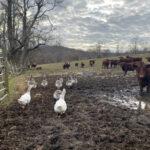ALBANY – Senator Sue Serino and Assemblymember Didi Barrett are teaming up to announce that their bill to designate Saw Kill and Fall Kill creeks as inland waterways has passed in both houses of the Legislature. The bill paves the way for municipalities along the waterways to participate in the Local Waterfront Revitalization Program (LWRP), qualifying them for state revitalization grants and empowering area communities to more effectively create long-term development and preservation plans.
“Passing this legislation is a great example of all that can be accomplished when committed stakeholders at every level come together to improve our local community,” said Senator Serino. “Preserving and enhancing our local waterways will play a key role in the economic and environmental future of the Hudson Valley, and I am proud to join Assemblymember Barrett in passing a bill that will allow these areas to access key state grants and planning tools to make these goals a reality. We look forward to seeing how they make the most of this great opportunity.”
“The Saw Kill and Fall Kill are two beautiful waterways that have long played a key role in Dutchess County’s recreational, environmental and cultural history,” said Assemblymember Didi Barrett. “By designating them as inland waterways we allow the communities along these creeks to access state and federal funds for pollution control, flood prevention, infrastructure improvement, and more in their critical role as stewards of these important waterways.”
The legislation was introduced at the request of the Dutchess County Cornell Cooperative Extension, with the support of local communities who support the inclusion of these creeks in the program.
“The passing of legislation to designate the Saw Kill and Fall Kill as inland waterways is a win for the Saw Kill and Fall Kill creeks and for communities along each waterway,” said Michelle Gluck, of Dutchess County Cornell Cooperative Extension.
LWRP funding can be obtained by eligible municipalities through Environmental Protection Fund (EPF) grants. According to the Department of State, this funding can be utilized to protect and preserve natural areas, improve water quality, guide development to areas with adequate infrastructure and away from sensitive environments, promote access to public waterfronts, and provide for the redevelopment of underutilized waterfronts.
The bill will be sent to the Governor to be signed into law.








